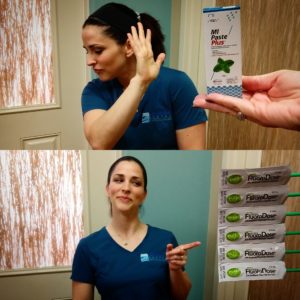A few years ago, I was a dedicated Colgate kid. That is, until one day I brushed my teeth and noticed the insides of my cheeks and lips felt rough. When I looked at my mouth in the mirror, I found that my tissue was sloughing like I had a sunburn. It didn’t hurt or feel irritated, but something wasn’t right. After some trial and error, I figured out that I was mildly allergic to something in Colgate products. Through the years, I have identified the same mild dermatitis reaction in many of my patients. Colgate is still a great brand, but some people are sensitive to it. What’s up with that?
Common Dental Allergies
Most of the time, allergic reactions to dental products are very mild and tend to show as just mild skin irritation like I mentioned above. Whitening agents, tartar control agents, and Triclosan (an antimicrobial found in some toothpastes) appear to be the most common culprits. However, sometimes essential oils and flavors can also be to blame. Crest ProHealth mouthwash can stir up redness and peeling in many people, as can the alcohol in Listerine.
You can develop this type of sensitivity spontaneously, even if you’ve been using the same product for years. If you notice chronic chapping at the inside edges of your lips, cracking in the corners of your mouth, or peeling on the inside of your lips and cheeks, don’t panic. Just try switching to a mild toothpaste like the original Sensodyne, and maybe stop using mouthwash until the irritation goes away. (But even Sensodyne True White, which is a great product, has caused this reaction in a few of my patients as well.)
Food Allergies and Dental Products
Patients with food allergies are generally pretty alert to potential triggers. However, dental products can contain hidden allergens where you might not expect. Be sure to always let your dental team know of any allergies, and bring your EpiPen to all your dental visits!
Patients with true gluten allergy, known as Celiac Disease, need to be aware that there may be trace amounts of gluten in many toothpastes. While most toothpastes do not contain gluten as a direct ingredient, some allow for small amounts of cross-contamination. If your allergy is severe, seek out pastes that explicitly claim gluten-free status. Arm&Hammer and Tom’s of Maine both claim to be fully gluten free.
Similarly, patients with an allergy to pine nuts should be aware that some fluoride varnishes used in professional applications contain tree nut-based resins.
Casein is one of the most insidious ingredients when it comes to dental products. This milk protein can be deadly for people with a true allergy. It is highly effective at fighting decay, so it is included in a handful of products. For the most part, however, manufacturers are moving away from it due to its potentially devastating effects on people who are allergic.
MI Paste and MI Paste Plus both contain milk-derived proteins. This is one of the few products we use at LBD with a potential allergen in it. Please let us know if you have a true allergy to milk proteins! This is not the same as lactose intolerance. These products will not affect lactose intolerant patients.
Lake Baldwin Dental Takes Allergies Seriously
Here at LBD, we take allergies very seriously. We are a fully latex-free office. All our products are gluten free. Our fluoride varnish does not contain any dairy products, egg products, gluten, soy, tree nuts or their derivatives, or seed products.
However, please do let us know if you are allergic to food dyes, as many polishing pastes may contain colors. We do have dye-free and flavor-free polishing paste available! And as stated above, MI Paste, which we use to prevent decay and reduce tooth sensitivity, does contain milk proteins, so please let us know if you have an allergy to milk products.
Most of us are fortunate not to suffer from allergies of this kind. However, your dental team is looking out for you so you can stay allergy-free and keep smiling, Orlando!


